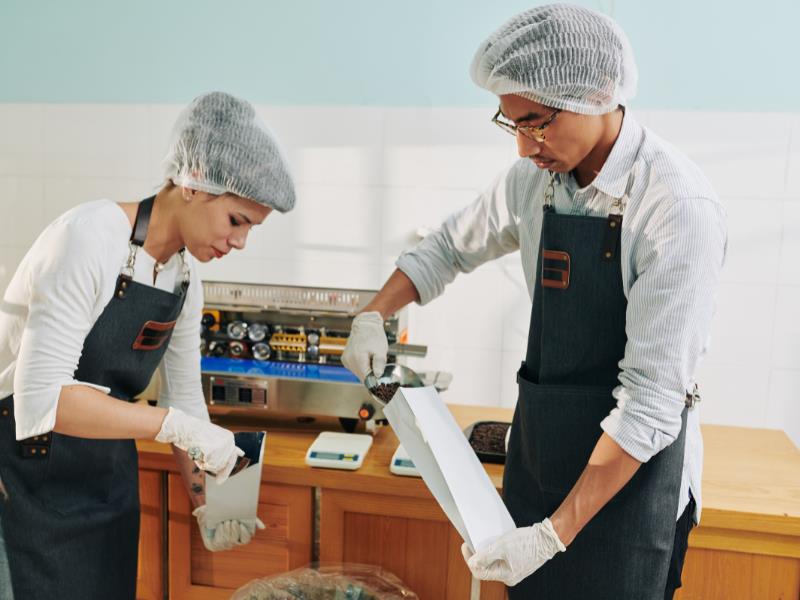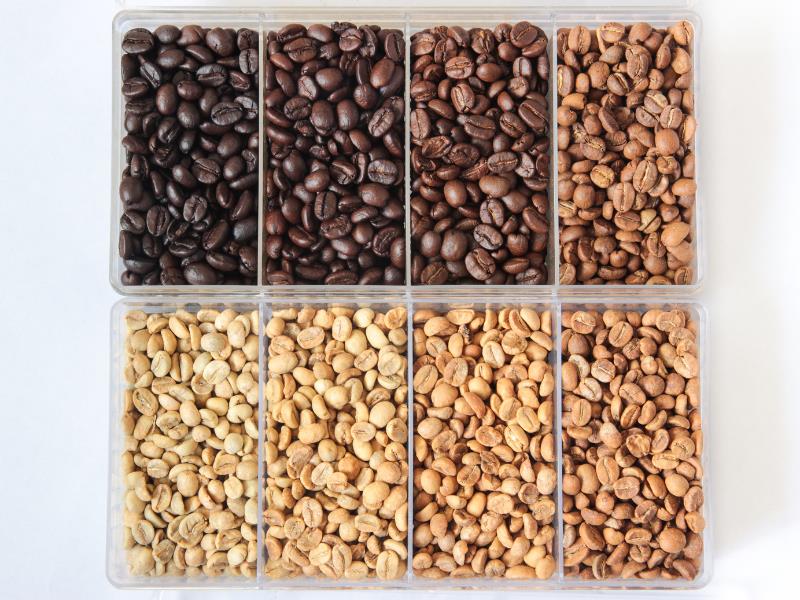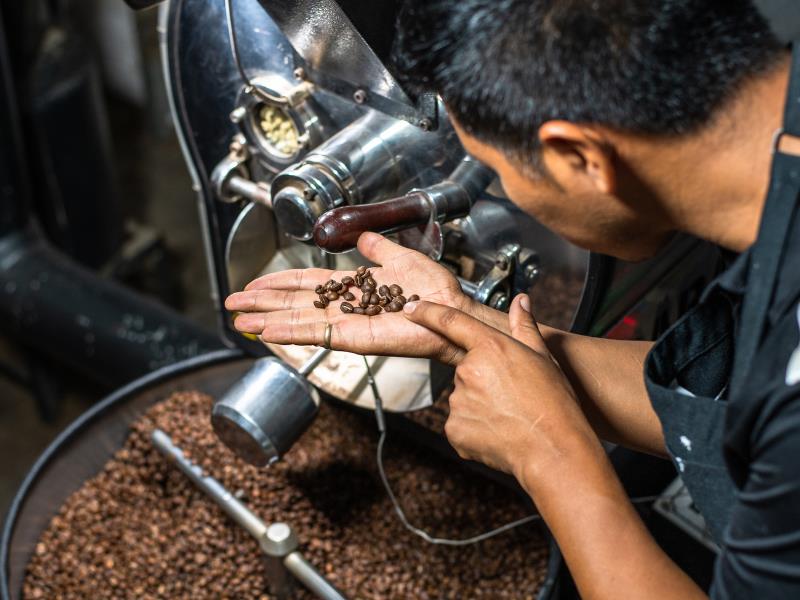Are you passionate about coffee? Do you friends know you as a Coffee Nerd? Do you already enjoy the process of brewing specialty coffee at home, buying green coffee beans and roasting them to perfection? Have you made a study of the science of it, creating blends your family and friends crave?
Do you also have a good head for business? Add those traits together, and you may have what it takes to start your own coffee roasting business. Got that Full of Beans feeling? Let’s get started.
What is a Coffee Roasting Business?
A coffee roasting business roasts green coffee beans to three levels: light (also called city), medium (full city) and dark (full city plus).
Coffee roasting businesses use large machinery, including a roaster and grinder, to turn the beans into the finished product. The finished specialty coffee product is bagged. The bags can be sold to individual people or business entities, such as coffee shops and wholesale customers. If you are doing your research, remember this is completely different than how to open a coffee shop.

How Much Does a Coffee Roasting Business Make?
When you’re doing calculations, here’s an important fact to remember: one pound of green beans, after going through roasting, becomes 12 ounces of roasted coffee. The beans lose 25% of their weight as they’re roasted.
Beans, sold in 100 pounds bags, typically cost from $3 to $4.50 a pound. Many roasted coffees are sold in 12-ounce bags at a price of $12 to $20 a bag (or $6 to $12 for wholesale prices.) Net profit margin on a per bag sale could range from $9 to $17.
How much can you make? That depends on how much demand you create. A coffee roasting business owner shouldn’t start small.
Here’s how to lose fledgling customers, in two easy steps:1. Get in the door by delivering a delicious batch of specialty coffee that customers love, and 2. Be unable to resupply in a timely manner.
It’s tricky. Coffee is best when it’s fresh. You want to work ahead, but not too far ahead because product will lose flavor. This is a juggling act, especially as you’re getting started.
In real world examples, here’s a basic formula. Let’s say you get a 15kg coffee roaster. That is equivalent to 33 pounds. Those in the business say that the roasters work best when operated at 70% of capacity. Using the 15 kg (33 pound) model, the best batch size is about 23 pounds. On average you can expect to make $5 for every pound you roast.
It’s important to know that roasting time varies by type of roaster and by the type of fuel it uses. To make a medium (full city) batch in a 15kg roaster on average will take from 15 to 18 minutes.
Provide a steady stream of quality coffee, and orders – along with a steady stable income stream – will follow.

The Coffee Biz in the United States
The roasting coffee industry is fueled by the coffee drinking industry. How much coffee do we drink? Americans drink an average of 3.2 cups a day, according to statistics on coffee consumption.
The coffee roastery is a growing franchise business, with several options for those researching how to start their own roasting business. Some of the franchises are set up to specialize in contract roasting, prepping beans for others.
In the stock market, arabica coffee futures are at a 10-year high, and trending to continue rising. That means retail prices are also increasing.
An offshoot of our coffee use growth – and source of more new business ideas – is the change to how it’s bagged. Upgraded packaging includes bags that can be sealed and resealed, to stay fresh longer. The bags are flexible, and often flat-bottomed, for easier storage. Making specialty bags is a business unto itself.
Want to learn more about coffee and the roasting process? Go to the specialty coffee association. Make sure you drink coffee as you do the research!
| Topic | Description |
|---|---|
| Coffee Consumption in the US | Americans drink an average of 3.2 cups of coffee per day, driving the demand for coffee-related businesses, including coffee roasteries. |
| Coffee Roastery Franchise Business | The coffee roastery industry is witnessing growth in the form of franchise businesses. Entrepreneurs interested in starting a roasting business have several franchise options, including those specializing in contract roasting. |
| Arabica Coffee Futures in Stock Market | Arabica coffee futures are at a 10-year high and projected to continue rising. This trend is influencing retail prices, indicating a favorable market for coffee roasting businesses. |
| Upgraded Packaging Trends in Coffee Industry | The growth in coffee consumption has led to innovations in packaging. Specialty coffee bags with resealable options and flat-bottomed designs for improved storage are becoming popular, creating new business opportunities. |
| Specialty Coffee Association | For those looking to learn more about coffee and the roasting process, the specialty coffee association offers valuable resources and information. Coffee enthusiasts can enhance their knowledge while conducting research. |
19 Important Steps for Starting a Coffee Roasting Business
Small business owners getting into selling roasted coffee do need to go big by purchasing a large coffee roaster capable of processing 15 kg.
Before making that big purchase, there are many steps you can take to get your coffee roasting venture off to a good start.
1. Carry Out Market Research on Other Coffee Roasters
Who else is roasting in your area? If there aren’t any local roasters, what are the sources used by those who are selling coffee in your area? Where are the local coffee shops getting their coffee?
If the local market is flooded, don’t despair. Shift your focus to online sales.
2. Consider Potential Startup Costs
(See 11 for specific costs)
The initial equipment investment includes commercial-sized coffee roasters and grinders.
Ongoing expenses include:
Coffee beans
Fuel for the roaster (electric, propane, etc.)
Rent/mortgage and utilities
Shipping and delivery
Equipment for packaging coffee
Vehicle or fleet (if you plan to deliver your freshly roasted coffee)

3. Choose a Niche
Where will you make sales in your commercial coffee business? Do you want to sell coffee to an individual or to a coffee shop? Do you want to serve coffee to customers at your own coffee shop? Do you want to deliver coffee to elite lodging establishments and restaurants?
Will you sell to grocery stores? Wholesale accounts? Retail locations?
Before you make your initial investment and begin to spend time roasting, imagine your ideal customer. As your business grows, keep that focus to the forefront.
4. Decide on a Business Name
Before locking in on a name, small businesses need to check several locations to make sure the name isn’t already taken. Check the state business records, as well as federal and state trademark records. Check web domain availability as well as social media platforms such as Facebook.
5. Brand Your Business
There are two main ways to help your business name get established as a recognizable brand – by your chosen logo and colors. In the past few years, as the demand for great-tasting coffee has increased, the competition has increased between one coffee company and another. If you don’t want to establish your own brand, you can also look into coffee franchise opportunities.
Kenya, South America, and Jamaica are top single-origin bean growers and suppliers. Brazil leads the way.
6. Write a Business Plan
Key elements of your plan are:
- Pricing
- Packaging supplies
- Logo for packaged coffee
- QR code
- Marketing/promotion materials
7. Set Up a Business Bank Account
In addition, get a separate business credit card.
8. Get Your Taxes in Order
You’ll need to pay:
- Sales tax – you’ll need an EIN to pay. You can get the EIN from the IRS.
- Business structure – You will have different tax obligations in line with your business setup. You may choose to be a limited liability company, a sole proprietorship, an S Corp, or a corporation. Unless you’re well-versed in this topic, enlist the services of a tax professional.
- Commercial real estate taxes
9. Choose a Venue
Are you going to sell to individuals or businesses? Or are they going to come to you? Do you want to set up your business selling different coffees in a refurbished warehouse or factory building? Or from a downtown bistro?
10. Find Good Suppliers
Coffee is grown commercially in 45 countries, with Brazil a leader. You can buy directly from a farmer, or from coffee traders or government agencies, which are part of the supply chain.
You’d think finding a reliable supplier would be easy, but it isn’t.
Places that are prime to growing coffee often have a climate that’s dicey. The weather and/or pests can destroy a crop. A coffee crop can be robust, but not available due to economics or politics.
11. Stock Up on the Necessary Equipment
You’re going to need some of this vital equipment to get a coffee roasting business off the ground:
- Commercial roaster $25,000 and up.
- Coffee Grinder $500 to $1,000.
- Heat sealer – $30 to $300.
- Green coffee – $3 to $4.50 per pound.
- Packing supplies and labels.
12. Register Your Business
In addition to registering as required at your state, county and city level, pursue Fair Trade certification. To become certified, you must follow fair trade guidelines. Savvy coffee afficionados want to protect the local farmers who are growing this product, and purchase from companies who are certified.
13. Purchase Business Insurance
These types of insurance policies will be necessary to start this business:
- General liability – A basic policy needed for nearly all businesses.
- Workers’ compensation insurance – Needed if you hire employees.
- Commercial property and liability insurance.
14. Decide on a Business Structure
The majority of new roasters choose the LLC for the business structure. The limited liability company protects your personal assets.
15. Get Permits and Licenses
Because you’ll be handling a “food” product, your premises will have to be certified by your local health department. Laws can vary by town, county and state, but this regulation is uniform – you won’t get a certificate of occupancy until you pass a health inspection.
16. Hire an Experienced Team
Roasting isn’t simple. You’ll need experienced employees who will expect to earn about $20 hourly.
17. Set Up a Business Website
This should be lively with frequent updates.
18. Market Your Coffee Roaster Business
A common way to grow your customer base is by holding “cuppings.” As it sounds, these are tastings. You can offer “cuppings” from a specific region or with specific blends you’ve created.
If you have a brick-and-mortar location, you can offer this service there. Also consider offering free “cuppings” at meetings such as Chamber of Commerce and other business-based boards. Attend conventions, art shows and similar happenings in and around your community. Free samples should be offered with a business card.
19. Scale Your Business
Remember, timing is critical. Coffee quickly loses aroma and flavor. Many in the business put the roast date on the bags.
If coffee gets a bit past its prime date, donate to local food banks and shelters. This will boost the reputation of your successful coffee roasting business.

Can you roast coffee at home and sell it?
Anyone can get a stove top model. These are saucepans with a tight lid and a special handle. The handle allows you to stir the beans, and a built-in thermometer keeps the temperature prime.
But, you won’t keep up with orders that way. Even the largest stove top size – which is about 250 grams – won’t supply even the smallest cafe.
If you have the space for a commercial roaster and packing area, you can do the business at home. But remember your premises will have to pass muster with the board of health.
Frequently Asked Questions (FAQs)
What does a coffee roasting business do?
A coffee roasting business roasts green coffee beans to different levels (light, medium, or dark) using large machinery like a roaster and grinder. The finished specialty coffee product is then bagged and sold to individual customers or business entities, including coffee shops and wholesale clients.
How much profit can a coffee roasting business make per bag of roasted coffee?
The net profit margin per bag can range from $9 to $17. However, the overall income depends on the demand created and the quantity of coffee roasted and sold. One pound of green beans yields approximately 12 ounces of roasted coffee after roasting, and the average income can be around $5 for every pound roasted.
Is there a potential market for a coffee roasting business in the United States?
Yes, the coffee roasting industry is fueled by the growing coffee consumption in the United States. Americans drink an average of 3.2 cups of coffee per day. The industry is witnessing a surge in demand, and the trend is expected to continue, making it a lucrative opportunity for coffee roasting businesses.
What are the startup costs involved in a coffee roasting business?
The initial equipment investment includes a commercial-sized coffee roaster and grinder. Ongoing expenses involve purchasing coffee beans, fuel for the roaster, rent/mortgage, utilities, shipping and delivery, packaging equipment, and vehicles for delivery, if applicable.
How can I find reliable coffee bean suppliers?
Finding a reliable coffee bean supplier can be challenging due to the impact of climate, weather, and politics on coffee crops. Researching coffee traders, and government agencies, or directly connecting with farmers in top coffee-growing countries like Kenya, South America, and Jamaica can be helpful.
What steps do I need to take to start a coffee roasting business?
The process includes conducting market research on existing coffee roasters, estimating potential startup costs, choosing a niche, deciding on a business name and branding, selecting suppliers, purchasing necessary equipment, registering the business, obtaining permits and licenses, hiring experienced staff, setting up a business website, marketing the business, and scaling operations.
Can I roast coffee at home and sell it?
While home roasting is possible with stove-top models, it is not practical for commercial quantities. For commercial operations, a proper coffee roaster and packing area are required, along with compliance with health department regulations. Home roasting can be a starting point, but scaling the business will require a more significant investment and setup.
Image: Depositphotos
This article, "How to Start a Coffee Roasting Business" was first published on Small Business Trends
------------Read More
By: Lisa Price
Title: How to Start a Coffee Roasting Business
Sourced From: smallbiztrends.com/2023/08/how-to-start-a-coffee-roasting-business.html
Published Date: Wed, 02 Aug 2023 11:30:51 +0000
Did you miss our previous article...
https://trendinginbusiness.business/business/its-the-hardest-time-in-recent-history-to-get-a-car-loan
.png)





